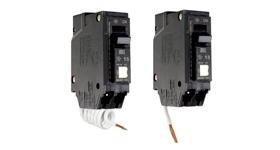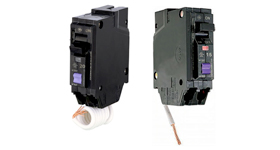Function and operation of residential circuit breakers
Residential circuit breakers are one of the most important safety mechanisms in your home. All the wiring in your house runs through a load center/power panel/breaker box. A typical load center houses all the circuit breakers your house needs to serve electricity. Circuit breakers monitor the flow of the electrical current and cut off the power when current levels are too high. Circuit breakers, or circuit interrupters, simply cut the power to decrease any potential disasters, such as fires in your home.
ABB offers three types of residential circuit breakers/interrupters:
Combination Arc Fault Circuit Interrupters (AFCI) – Provides arc fault protection to prevent fires.
Ground Fault Circuit Interrupters with Self-Test (GFCI) – Provides ground fault protection to prevent shock.
Dual Function Circuit Interrupters (DFCI) – Provides ground fault and arc fault circuit protection in one unit.
Types of residential electronic circuit breakers (interrupters)
Combination Arc Fault Circuit Breakers (AFCI)
Provides arc fault protection
According to USFA, in 2019, there were 24,200 residential fires due to electrical malfunction. Many of these fires resulted from arc faults. Arc faults are unintended electrical arcs that may ignite combustible materials in the home. Four types of arc faults may occur: line-to-line, line-to-ground, line-to-neutral, or a series arc fault, which is arcing over a gap within a single wire.
Arc Faults may arise from numerous different situations
Damaged wires
Wires pinched to the grounded metal box
Worn electrical insulation
Corroded connections
Loose electrical connections
Shorted wires
Wires or cords in contact with vibrating metal
Overheated or stressed electrical cords and wires
Misapplied/damaged appliances
ABB ReliaHome™ Combination AFCIs help protect against all types of arc fault incidents. An arc fault circuit interrupter (AFCI) detects arc faults and de-energizes the circuit before a fire can start. ABB ReliaHome Combination AFCIs offer multiple kinds of protection.
Parallel protection − Combination AFCIs can detect and interrupt parallel arc faults (line-to-line, line-to-ground, line-to-neutral, or a series arc fault).
Series Protection − A series arc fault is the unintended flow of electricity over a gap within a single wire. These arc faults were not detectable until advanced technology allowed the development of the Combination AFCI breaker.
Overload protection
Short circuit protection
These combination AFCIs electronically identify unique current and voltage characteristics of all arc faults and de-energize the entire circuit when one occurs.
Residential Building Electrical Malfunction Fire Trends (2010‑2019)
Ground Fault Circuit Breakers with Self-Test (GFCI)
Provides ground fault protection
The GFCI circuit interrupter protects against overloads, short circuits, and ground faults. It detects very low levels of electrical current leakage (ground faults) and acts quickly to shut off power, preventing serious shock.
What is a Ground Fault?
Normally, the electrical current traveling to an electrical appliance is equal to the current traveling from that appliance. However, an imbalance in that flow indicates a current leak — also referred to as a “ground fault,” because the leaking current is escaping to the ground.
If the leaking current is traveling through a person, that person could be injured, burned, severely shocked or electrocuted. For example, when a hair dryer is dropped into a sink full of water, some of the electrical current leaks out of the appliance and into the water. This current leak could be enough to kill someone who comes in contact with the water.
The National Electrical Code requires GFCI protection of receptacles located outdoors, in bathrooms, garages, and spa areas. This applies not only to new construction but also to existing homes. When an electrical outlet is replaced in a location that requires ground-fault protection, the new outlet must be GFCI protected, according to the NEC.
Why ABB ReliaHome™ Ground Fault Circuit Interrupters with Self-Test?
Self-test functionality is a UL requirement on all GFCI devices that began in June of 2015. This variant of the GFCI ensures its ground fault circuitry is functioning properly by automatically running diagnostic testing periodically. Should a problem be detected, the circuit breaker will trip and will need to be replaced.
When installed in a home’s load center, the ABB ReliaHome GFCI Self-Test does everything a circuit breaker is designed to do, plus it helps protect people against dangerous electrical shock caused by ground faults. Whenever it detects a ground fault, it almost instantaneously shuts off the power, helping to prevent an electrical shock.
Specifications:
1 or 2 pole
15A, 20A, 25A, 30A, 40A or 50A
10kAIC
120 Vac or 120/240 Vac
Wire Range #14-8 AWG CU / #12-8 AWG AL
Dual Function Circuit Breakers (DFCI)
Provides ground fault and arc fault circuit protection in one unit
In recent years, the National Electric Code has mandated Ground Fault and Arc Fault circuit protection on many 15 and 20-amp kitchen and laundry circuits. ABB’s ReliaHome Dual Function Circuit Breaker (DFCI) offers both Ground Fault and Combination Arc Fault (GFCI and AFCI) protection in a simple to apply and cost-effective package.
Dual function circuit breakers utilize both GFCI and AFCI detection technology.
GFCI protection guards against ground faults, and helps prevent electrical shocks. GFCI circuit breakers detect when the current is “leaking” somewhere outside its intended path. If your body provides the path to ground for this “leakage” you could be burned, shocked, or even electrocuted.
AFCI protection guards against damage or fires that can result from arcing and sparking. Arc Faults can arise from deteriorated wires, poor connections, and breaches in wire insulation. The added safety provided by AFCI protection is an important step forward in reducing the risk of electrical fires.



